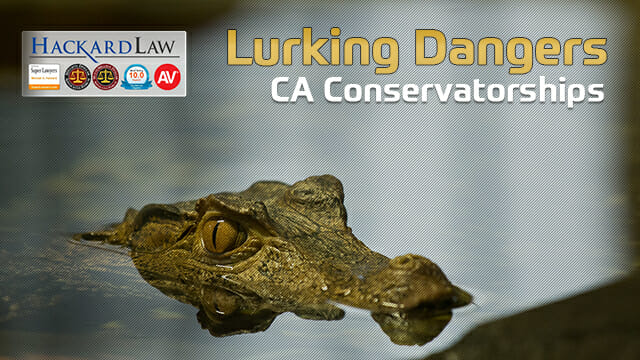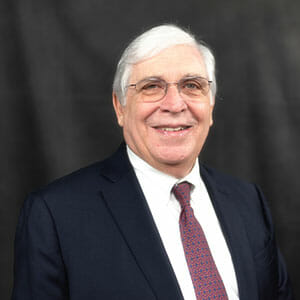
Plain Talk About California Conservatorships | Lurking Dangers

Plain Talk About California Conservatorships | Lurking Dangers
- July 23, 2020 - Abused Beneficiaries, Elder Financial Abuse,
You’re concerned – frustrated – baffled.
Your mom or dad is in failing health. Maybe they’ve been taken in a senior scam. Maybe their bills are piling up. They don’t remember how to pay them. Or they’ve left the stove on hours after cooking. You can fill in the blanks.
I saw this with my own mom. My friends have seen it with theirs. But you have not faced this before.
You talk with your mom or dad about your concerns. To them everything is fine. You have few people that you can talk to about this. So, you go online.
You see they’re lots of lawyers describing themselves as conservatorship attorneys. In California there are licensed fiduciaries. They advertise themselves as compassionate. You want to read the fine print, but there isn’t any.
So, look at the reviews when they’re available. The reviews are from people just like you that entrusted their parents’ freedom and fortune to third parties appointed by the government – in this case a probate court. If it works well – good.
But take a look at how some family members describe how it doesn’t always work well. I’ll directly quote from some of these reviews. I won’t identify the conservators and I note these are accusations – not court findings. Still, the reviews capture the very common problems of conservatorships.
“I found this ‘conservator’ not at all interested in saving someone else’s money as it will be too late once she files a court accounting. She will over-pay for services wasting and depleting your family’s estate while using conservator funds if you decide to object in court.”
“(The Conservator) has her own agenda which she doesn’t tell you up front. She doesn’t tell you until she’s ready to go over your head and get the court to rubber stamp approve it. It’s like getting sucker punched. We will not soon forget this unpleasant, toxic experience. We’ll be paying for it for a long time, too. Hopefully other families can be spared the harsh lessons we learned the hard and expensive (both emotionally and financially) way.”
“Never hire this a For – Profit Fiduciary who owes several millions in debt. Do your own due diligence why she would take an elder’s home that was debt free and then take $100,000 in loan proceeds so she could pay herself ongoing fees $13,000 yearly and then let the house go to foreclosure…after she got what she wanted.”
“During a recent trustee case, (the trustee) consistently presented incomplete, inaccurate, or outright false information, violated the Will she was bound to carry out, made assertions that were, at best, erroneous, displayed atrocious bedside manner, refused to acknowledge, let alone accept errors, ignored repeated attempts to present important information, and even gave away an heir’s property to someone who had been specifically disinherited.”
So, these are only a few reviews. They are indicative of a nationwide problem. Fiduciaries, whether guardians or conservators, are supposed to take care of people physically and also take care of their financials.
There are national leaders who’ve sacrificed their time and fortune to bring attention to the scandal of rogue fiduciaries and their attorneys. Rick Black of the Center for Estate Administration Reform has brought attention to professional guardians and their attorneys who use guardianships as a cover for their criminal acts. Carole Herman of the Foundation for Aiding the Elderly is an incredible advocate for protecting the weak, fighting the powerful, and demanding that the government do its job. Dr. Sam Sugar, the founder of Americans Against Abusive Probate Guardianship, is a tireless advocate for families who are dealing with and trying to avoid the economic, physical and psychological abuses of conservatorships and guardianships.
These national leaders are not alone in bringing attention to this national scandal. Clark County, Nevada District Attorney Steve Wolfson, says “I can’t imagine a class of people more susceptible to criminals than wards of a court.”
On a personal note, my law firm is rarely involved in conservatorship proceedings. We far more often represent abused trust beneficiaries and heirs. It is this experience that has seared some deep impressions into my view of some fiduciaries.
A fiduciary’s first duty is to the trust beneficiary. This duty is stained by fiduciaries who say their duty goes solely to an inanimate document or the problematical intent of a trust maker. Fiduciaries vary widely in their interpretation of a trust’s health, education, maintenance, and support clause.
Some will treat the trust beneficiaries like adults and fully explore how to benefit them – that’s what is supposed to happen – thus the name “beneficiaries” – those who benefit. Others act like penurious accountants from Scrooge and Marley. We regularly litigate in this area and are often shocked by the lack of caring and expertise of some fiduciaries.
My final note of caution is that a fiduciary is supposed to be good. Conservator and conservatee, trustee and beneficiary, and principal and agent are all recognized fiduciary relationships.
California case law tells us that a fiduciary relationship is ‘any relation existing between parties to a transaction wherein one of the parties is in duty bound to act with the utmost good faith for the benefit of the other party. Such a relation ordinarily arises where a confidence is reposed by one person in the integrity of another, and in such a relation the party in whom the confidence is reposed, if he voluntarily accepts or assumes to accept the confidence, can take no advantage from his acts relating to the interest of the other party without the latter’s knowledge or consent. …”
This is what we expect of fiduciaries: Act in good faith for the benefit of the other. Families are relying on the integrity of the fiduciary. They’re putting their confidence in them. And they don’t expect the fiduciary to take advantage of them.
My comments are not meant to be an indictment of all fiduciaries. It is my hope that they can help to bring caution to families who blindly look to others – many times for-profit strangers – to solve problems stemming from a senior’s mental decline.
If you found this segment useful, make sure to like the video and subscribe – you can help give us a boost in the fight against elder financial exploitation. Hackard Law represents elders and beneficiaries injured by fiduciary wrongdoing – you can reach us today at 916-313-3030.
Attorney Michael Hackard
 Michael Hackard is a top rated “AV” for over 20 years (“AV Preeminent is a significant rating accomplishment- a testament to the fact that a lawyer’s peers rank him or her at the highest level of professional excellence.”). Avvo also ranks him with their highest rating – “ 10.0 Rating – ‘Superb.’” Michael is also a “SuperLawyer” – an honor reserved for no more than five percent of attorneys in each state. [ Attorney Bio ]
Michael Hackard is a top rated “AV” for over 20 years (“AV Preeminent is a significant rating accomplishment- a testament to the fact that a lawyer’s peers rank him or her at the highest level of professional excellence.”). Avvo also ranks him with their highest rating – “ 10.0 Rating – ‘Superb.’” Michael is also a “SuperLawyer” – an honor reserved for no more than five percent of attorneys in each state. [ Attorney Bio ]
RECENT POSTS
- Estate Litigation and the Great Baby Boomer Wealth Transfer
- Understanding Traumatic Brain Injury: Common Types Resulting from Car Accidents
- Exceeding Expectations: How Our Contingency Fee Approach Benefits Estate, Trust, and Traumatic Brain Injury Clients
- Unlocking the Science: Factors Impacting Traumatic Brain Injury in Car Accidents Explained
- Key Factors in Assessing Sacramento Car Accident Severity
CATEGORIES
- Abused Beneficiaries
- Catastrophic Injury
- Celebrity Estate Battles
- Community
- Coronavirus Liability
- Dependent Adult Financial Abuse
- Elder Financial Abuse
- Estate Litigation
- Estate Planning
- Firm News
- Legal Advocacy
- Life Insurance Beneficiary Litigation
- Traumatic Brain Injury
- Trust Litigation
- Trusts Accounting
- Will Contests
- Wrongful Death

